Clinton's ethical issues are still her biggest liability
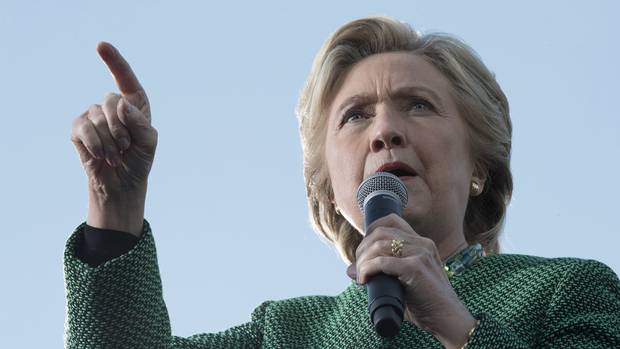
Hillary Clinton speaks at a campaign event in Charlotte, N.C., on Oct. 23, 2016.
MARY ALTAFFER/ASSOCIATED PRESS
For many weeks, pundits speculated about what sort of last-minute twist might breathe life back into Donald Trump's campaign. Bad economic news? Terrorism at home? Crisis abroad?
In retrospect, we should have guessed that if anything, it would be an untimely reminder of Hillary Clinton's ethical issues – her biggest liability since way back in her nomination race, as past decisions have come back to bite her again and again.
Granted, the way it arrived was surprising. Nobody's crystal ball had the FBI uncovering e-mails involving Ms. Clinton during a separate probe into the sexting habits of former congressman Anthony Weiner, thus announcing on Friday that its closed investigation into the Democratic nominee's use of a private server while Secretary of State might be reopened. (The e-mails seem to have been to Mr. Weiner's wife, Huma Abedin, one of Ms. Clinton's closest aides.)
But more than a year after Bernie Sanders assessed during a Democratic debate that Americans are "sick and tired of hearing about your damn e-mails," they're still hearing about them. Never good at explaining herself on this, often reinforcing a perceived sense of entitlement, she's now going to have to try yet again.
Fortunately for Ms. Clinton, most of her supporters long ago chose to look past this controversy, or at least determined it pales next to the problems with Mr. Trump. But there are still enough fence-sitters to make the election result less of a foregone conclusion than it was Friday morning.
Clinton's promise to work better with Republicans is a pipe dream
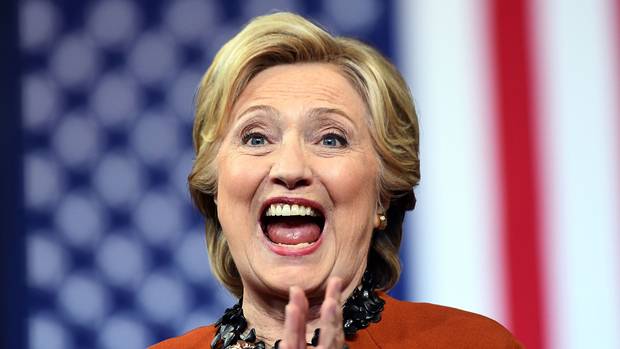
Hillary Clinton listens to first lady Michelle Obama speak a campaign rally in Winston-Salem, N.C., on Oct. 27, 2016.
JEWEL SAMAD/AFP/Getty Images
A big selling point for Ms. Clinton was supposed to be her ability to reach across the aisle. Sure, she lacked Barack Obama's ability to excite fellow Democrats. But less aloof than the incumbent, more willing to spend her nights drinking and negotiating with Republicans, she would be better able to get past the partisan impasses that have plagued Mr. Obama's presidency.
If it was possible to cling to this idea even through the incredibly toxic rhetoric of the past few months, Republicans' recent reaction to her polling lead should set it to rest.
This week, the Republican chair of the House of Representatives' Oversight Committee told the Washington Post that he intends to launch ethics investigations the moment Ms. Clinton takes office. Even before the FBI story on Friday, Jason Chaffetz wasn't about to wait to see if she offered fresh fodder, boasting "we've got two years' of material already lined up."
Meanwhile, Ted Cruz suggested that after preventing Mr. Obama from filling the Supreme Court vacancy left by Antonin Scalia's death on the basis that it was too late in his presidency, Republicans might also block Ms. Clinton from doing so – a prospect also raised recently by John McCain.
In other words, unless the Democrats improbably take back both the Senate and House, Ms. Clinton appears set to run into the exact same wall Mr. Obama did: a Republican caucus that sees no advantage in handing her victories and lots of danger in being seen by the party's base as too soft.
Even Hillary hate won't be enough to unite the GOP
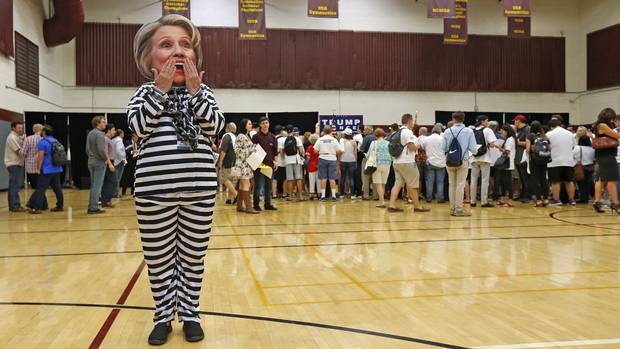
Trump supporter Beth Lyerla of Gilbert, Ariz., wears a Clinton mask and a prison outfit as she waits for Donald Trump Jr. to speak at a campaign rally at Arizona State University on Oct. 27, 2016, in Tempe, Ariz.
ROSS D. FRANKLIN/ASSOCIATED PRESS
Nearly as improbable as Ms. Clinton building bridges across the aisle if she wins, is the hope among some Republicans that their own civil war will come to an end if Mr. Trump loses.
The fissures are too numerous to count at this point, but the broadest is between traditional conservatives who make up the majority of the GOP's elites and the large share of the GOP's base drawn to Mr. Trump's angry, nativist populism.
Earlier this week, Mr. Trump was trying to persuade supporters that Republican leaders were in on a grand conspiracy to keep him from power. Meanwhile, a Bloomberg behind-the-scenes look at Mr. Trump's digital operation explained how, partly by using the GOP's own data system, his campaign will by the end have amassed as many as 14 million e-mail addresses that could be used to subsequently mobilize supporters against the party – whether by Mr. Trump himself, or if he loses interest, then by someone else .
The short-term, tried-and-true way for Republican lawmakers to keep the base at bay would be to go harder and harder at Ms. Clinton. But when they have to put forward candidates and policies of their own, the differences may be irreconcilable.
The Democrats need to worry about complacency
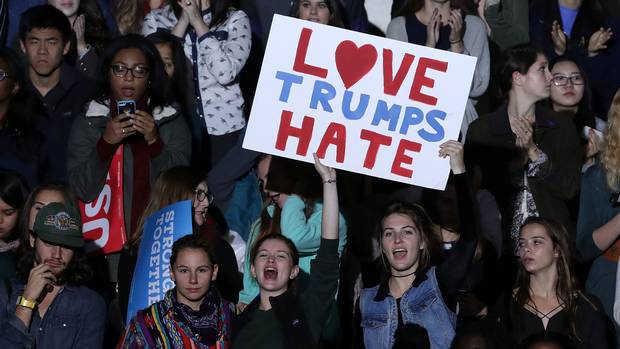
Supporters cheer as U.S. first lady Michelle Obama campaigns with Ms. Clinton in Winston-Salem, N.C., on Oct. 27, 2016.
ALEX WONG/GETTY IMAGES
Fear of a Trump victory is clearly the strongest motivator for Democratic voters. So recent polls consistently showing him well behind might be a mixed blessing.
One of those polls, conducted Oct. 20 to 24 by Ipsos for Reuters, found that 92 per cent of Ms. Clinton's supporters expect her to win, up from 83 per cent the previous month. Meanwhile, a Washington Post/ABC News poll taken Oct. 23 to 26 found that 45 per cent of Ms. Clinton's supporters foresee an easy win.
It's conceivable that the return of the e-mail scandal will tighten the numbers enough to scare Democrats, perversely helping Ms. Clinton. Or unhappiness with her could conspire with dismissal of his chances to keep voters home.
There's some method to Trump's minority 'outreach'
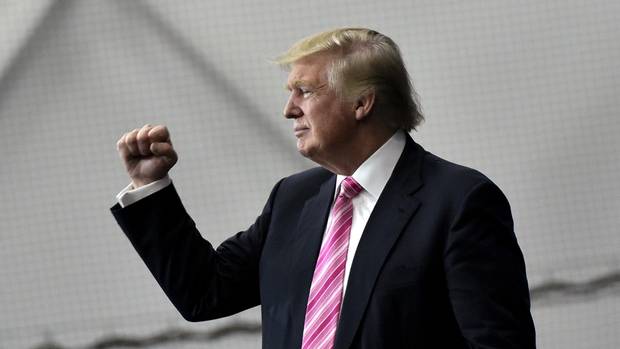
Donald Trump gestures after a rally at Spooky Nook Sports center in Manheim, Pa., on Oct. 1, 2016.
MANDEL NGAN/AFP/GETTY IMAGES
When Mr. Trump started ostensibly reaching out to African-Americans this fall, telling them they've "never had it worse," it was plainly not a serious effort to win them over. But the most common explanation for what he was doing – playing to his own white supporters with fake empathy – may not have been quite right either.
In that Bloomberg report about his digital operations, an unnamed senior official from Mr. Trump's campaign explains that African-Americans are the targets of one of several "voter suppression" campaigns. As evidence, the story points to a new ad campaign, on African-American radio stations and directly targeted through Facebook, that highlights Ms. Clinton's use of the term "super predators" (seemingly in reference to some young African-American men) while defending controversial crime legislation in the 1990s.
Mr. Trump's rhetoric on the trail has been much clumsier than that, possibly enough to accidentally motivate African-Americans to come out against him. But at least now we have a better idea of what he's trying to do.
Follow Adam Radwanski on Twitter: @aradwanski
MORE FROM THE GLOBE AND MAIL
Sprint through all three U.S. debates in three minutes
3:18

